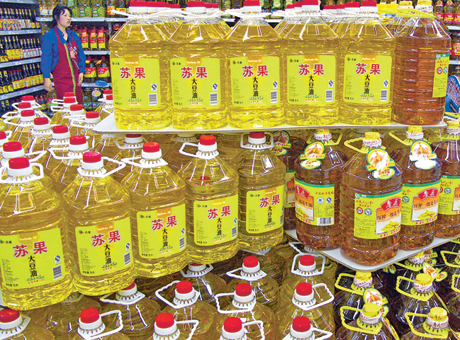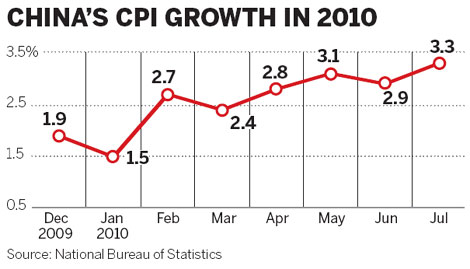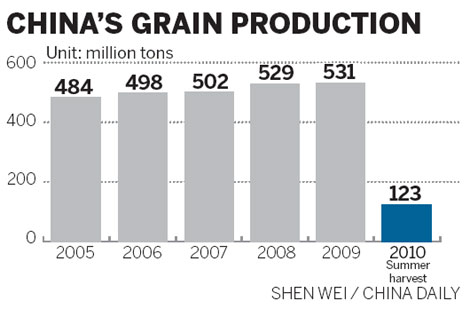Business
China told to develop its own GM food
By Lan Lan (China Daily)
Updated: 2010-08-23 13:18
 |
Large Medium Small |
|
 China has been a net importer of soybeans since the mid-1990s. Most of the imports were genetically modified (GM) and used to make edible oil to meet an annual market demand of 10 million tons for soybean oil in the country. Now, Chinese agricultural experts say the country needs to step up agricultural innovation, including development of its own GM varieties to address climate change and reduce reliance on foreign technologies. Xiao En / China Foto Press
|
Zhai Huqu: Making technical preparations for transgenic technology is very necessary for nation
HARBIN - The Chinese consume millions of tons of genetically modified (GM) soybean oil every year without fuss despite the fact that attitudes toward GM food remain as divergent in the nation as they are in the rest of the world.
China needs to step up agricultural innovation, including development of its own GM varieties, in response to

climate change and to reduce reliance on foreign technologies, top agricultural experts and scientists told China Business Weekly last week.
The genetic modification of food involves the insertion of genes from one variety of a crop to another in order to transfer certain desired characteristics such as insect-resistance or drought tolerance.
The technology is controversial. Critics say it is inherently risky to mess with nature. Supporters say it will prevent food shortages.
GM crops can provide solutions to various problems facing the ecosystem such as limited land and water resources, scientists say.

"Making technical preparations for transgenic technology is very necessary for China," said Zhai Huqu, president of the Chinese Academy of Agricultural Sciences.
However, the government has yet to approve use of the technology, Zhai said.
Last year, China issued bio-safety certificates to two strains of pest-resistant GM rice and corn. The strains still need about three to five years of registration and production trials before commercialization.
"Apart from transgenic soybean oil there should not be any GM crops on the market," Zhai said.
China has been a net importer of soybeans since the mid-1990s. Imported soybeans from the United States and Argentina are mainly genetically modified.
China consumes about 10 million tons of soybean oil and about 40 million tons of soybean meal per year in processed food and animal feedstuff, industry analysts said.
More than 80 percent of the total is imported GM soybean oil or made from imported GM soybeans.
Approval has not been given for the import of GM crop seeds.
International companies such as Monsanto, which have already sold seeds of GM cotton and conventional crops in China, have started exploring the potential GM market in China.
The majority of US and Argentina corn producers have adopted GM technologies, said Kevin Eblen, Monsanto's regional leader in North Asia and president of Monsanto China.
"We are working to get those approvals in China," he said.
To make its seeds more adaptable to China's situation, the company set up a research and development center in China last December and carried out joint research with several Chinese institutes.
"We are here in China to try to find the best products for China's soil type, climate and environmental conditions," said Eblen.
He declined to reveal Monsanto's revenue or market share in China. The published annual global revenue of the company is roughly $11 billion.
China is the number one growth opportunity for Monsanto in the long term, he said.
"China for us today is still a relatively small piece of our overall business but, obviously, with the size of agriculture here, particularly in crops that we are involved in, such as corn, vegetables and cotton, there are opportunities for our business here," he said.
Companies including Monsanto have developed crops with high drought tolerance.
Chinese agricultural research institutes should catch up and develop their own anti-drought crops to reduce possible reliance on foreign technologies, said scientists.
"Currently we only deal with disasters such as droughts or floods passively when they occur, which isn't a long-term solution," said Wang Ren, director of the Consultative Group on International Agricultural Research.
As climate change is bringing more uncertainties, it's urgent for China to move quickly to develop its own anti-drought varieties, both conventional and GM products, he said.
To ensure China's food security, the key is to enhance its agricultural technology level in all aspects, Wang said.
"GM is a potential technology, but its development must be well under the nation's transgenic safety and quality assessment system. All things should be assessed under the framework," he warned.
The nation needs to carefully study what kind of products will be needed in the next 15 years when investing in agricultural technologies, said Fan Shenggen, director-general of the Washington-based International Food Policy Research Institute.
Factors such as climate change and alterations to water resources need to be taken into consideration when designing the plans, he said.
Environmental groups such as Greenpeace have long expressed concerns about the spread of GM food. Disputes over GM food are most intense in Japan and Europe.
In February, the Indian government reserved a decision to allow Monsanto to sell its GM eggplant crop in India. The decision to commercialize the eggplant sparked concerns that the market might be monopolized and the product could threaten the health of humans.
Fan said GM technology provides a new choice. It's good for increasing the income of farmers and reducing costs to consumers. However, at the same time, new technologies always have risks.
Scientists should provide statistics and reports about any impact on health and the environment. It must be the farmers and consumers who make the final decision whether or not to plant or consume GM food, said experts.
Fan urged the government to take environmental protection into consideration in transgenic technology development from the very beginning.
Anton Mangstl, director of the Office of Knowledge Exchanges, Research and Extension of Food and Agriculture Organization of the United States, said GM technology was one direction for agriculture.
"If the technology can be used in a wise way, I personally believe GM technology in the long term can be a contribution to agricultural food security," he said.
The high level tolerance of some GM plants can address various problems that the ecosystem is facing from such things as drought and insects, said 2004 World Food Prize Laureate Monty Jones, executive director of Forum for Agricultural Research in Africa.
"So far there are no major problems to health. I agree there might be problems that have yet to be identified, but the risks are very, very low," he said.
People for and against GM food should stop fighting and come together, do surveys from time to time, every year or every two years, look at the potential and the benefit and the risks, if there are any, so they are able to advise the community, he added.
"When you don't know something, how do you judge it? You can't and shouldn't stop science, but choices should be made by society. We can control it," said Ajit Maru of the Global Forum on Agricultural Research.
About 40 percent of the food in the world is wasted in various ways, either in losses or not eaten. The globe is not short of food in that sense, but short of being able to use food effectively, he added.
|
 |
|
 |
China Daily